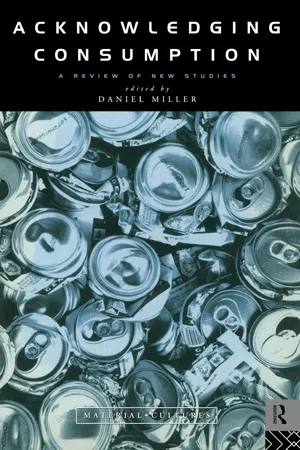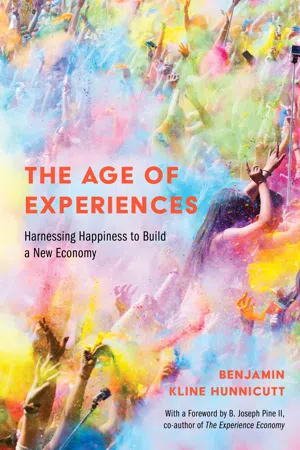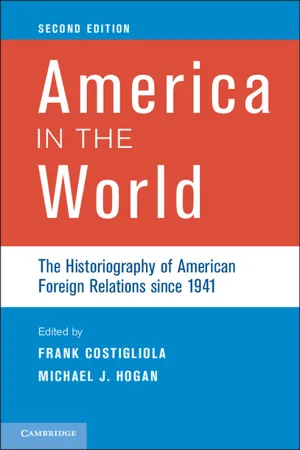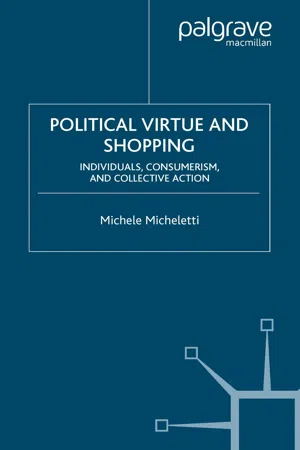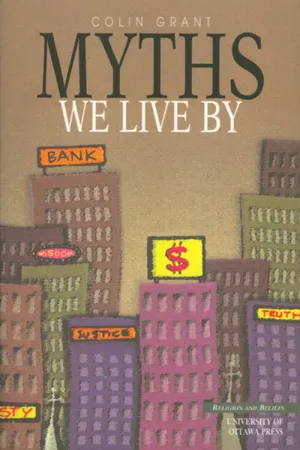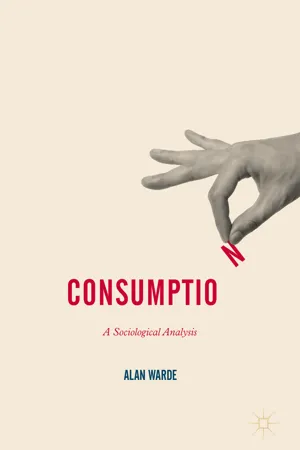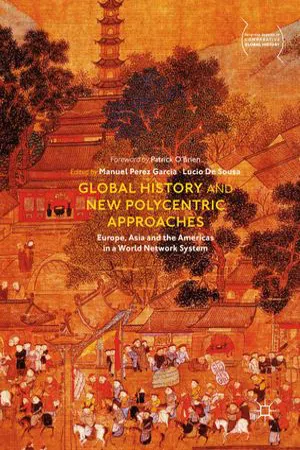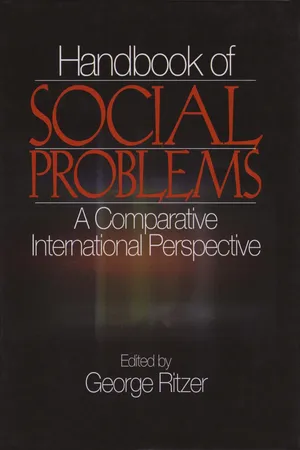History
Consumerism
Consumerism refers to the social and economic ideology that encourages the acquisition of goods and services in ever-increasing amounts. It gained prominence in the 20th century, particularly in Western societies, as mass production and advertising fueled a culture of materialism and consumption. Consumerism has had a significant impact on the global economy, shaping patterns of production, consumption, and waste.
Written by Perlego with AI-assistance
Related key terms
1 of 5
10 Key excerpts on "Consumerism"
- eBook - ePub
- Daniel Miller(Author)
- 2005(Publication Date)
- Routledge(Publisher)
5 CONSUMPTION WITHIN HISTORICAL STUDIES
Paul Glennie
IThe significance of consumption for history
INTRODUCTION AND BACKGROUND
Earlier this century, industrial and agricultural revolutions were being discovered almost everywhere that historians looked. Recently it has been consumer revolutions, at least among European and American historians (little literature has hitherto addressed other histories of consumption, though see Clunas 1991). Phrases like the birth of consumer society, emergent modern consumption, the rise of mass consumption, and the rise of mass market culture have been applied to the sixteenth and early seventeenth centuries (Thirsk 1978); Restoration England (Earle 1989: Shammas 1990; Weatherill 1988); the early eighteenth century (Eversley 1967); the Georgian period (Campbell 1987; McKendrick, Brewer and Plumb 1982; Williams 1987); the late nineteenth century (Fox and Lears 1983; Fraser 1981; Lee 1981); and between the two World Wars (Miller 1991). And, of course, each account raises questions about defining ‘consumer society’, and about consumption’s connections to wider economic and cultural changes.This proliferation reflects both continuous growth in Western consumption, and historians’ various definitions of ‘consumer society’. In addition, work on consumption is characterised by fragmentation, with very many local case-studies. Most general treatments of consumption either cover short periods and a single country, or take a long-run comparative view only for certain goods. The sheer variety of available sources (artefactual, documentary, visual, literary), and the divergent agendas of specialised research fields in different countries, exacerbate diversity and fragmentation. Different histories inform, and are informed by, highly divergent general analyses on consumption, and many historians distrust explicit theorising as a comparative and synthesising device. - eBook - PDF
- Steven Miles(Author)
- 2001(Publication Date)
- SAGE Publications Ltd(Publisher)
It is in this sense that Consumerism has emerged as the dominant mode of cultural reproduction in the West over the course of modernity (Slater, 1997). Consumption is no trivial matter in the sense that 'The ideological dimensions of Consumerism are, in effect, shielded from consumers by their ability to consume' (Miles, 1998a, p. 152). It is precisely because of Campbel l's point that consumers are never entirely satisfied that Consumerism manages to maintain its powerful ideological element. But ideology should not necessarily be assumed to operate as a one-way street. Consumers are at least partial ly aware of the sorts of power dimensions that underlie what it is we consume (and in particular the power of massive multi-national companies such as Microsoft, Coca-Cola and Nike). Consumers are perfectly capable of endowing their own meanings in their Microsoft software or their Nike training shoes. Regardless of how commodified a particular football club may or may not be, the emotional investment an individual places in that club ensures that such consumption is, at least in one sense, personal in nature. The irony of all this, of course, is the fact that we feel such consumption is personal makes it utterly impersonal, in the sense that the ideologica l impact of Consumerism is inevitably intensified as a result. Various authors have attempted to come to terms with the para-doxical dimensions of Consumerism. I myself have used the notion of the 'consuming paradox'. That is, the degree to which Consumerism, on the one hand, appears to offer all sorts of opportunities and pre-viously unexplored experiences, and yet, on the other, we appear to be directed down certain predetermined routes of consumption which ensure the constraining dimensions of Consumerism as a way of life (Miles, 1998a). It is this paradox which serves to create a situation in which consumerist ideology is actively lived. - eBook - PDF
The Age of Experiences
Harnessing Happiness to Build a New Economy
- Benjamin Hunnicutt(Author)
- 2020(Publication Date)
- Temple University Press(Publisher)
More recently, however, scholars and researchers in consumer culture theory, siding with traditional promoters, have come to the defense of Consumerism, recognizing a growing economy’s positive contributions to individual free-dom, social engagement, and healthy cultural formation. A historical account of this ninety-year debate about Consumerism pro-vides a perspective from which one may observe the development of a larger, “novel dialectic” growing from capitalism’s contradictions, including con-sumerism, and the possible emergence of a “new synthesis” made possible by the experience and transformation economies as they begin to more fully realize the positive potential of Consumerism revealed by consumer culture theory. 3 Origins of Modern Consumerism and Its Critics: Herbert Hoover and the 1920s The enshrinement of Full-Time, Full Employment in public policy and American politics during Roosevelt’s second term (outlined in Chapter 1) fol-lowed the laying of its cultural foundation during the 1920s. Business’s “new economic gospel of consumption” proclaimed then that the economy could and should grow eternally, founded on a new, “optional consumption”—on the promise that people would continue to work for and buy things they Consumerism AND ITS CRITICS / 65 had never seen before, in perpetuity. 4 The new “gospel” was met by a chorus of doubters who inaugurated a critique of Consumerism that has been re-peated, with changes rung on its major themes, since then, the latest iteration being complaints about the coming of the experience and transformation economies. - eBook - PDF
America in the World
The Historiography of American Foreign Relations since 1941
- Frank Costigliola, Michael J. Hogan(Authors)
- 2013(Publication Date)
- Cambridge University Press(Publisher)
Indeed, as so much of the rich scholarly literature suggests, politics plays out on the fields of hopes, dreams, and fears that mass consumer sensibilities have conjured. Notes 1 Major recent studies of the global history of Consumerism include Peter Stearns, Consumerism in World History: The Global Transformation of Desire, revised ed. (New York: Routledge, 2006); John Brewer and Frank Trentmann (eds.), Consuming Cultures, Global Perspectives: Historical Trajectories, Transnational Exchanges (Oxford: Berg, 2006), quote, pp. 51–52; Frank Trentmann (ed.), The Making of the Consumer: Knowledge, Power and Identity in the Modern World (Oxford: Berg, 2006). Craig Clunas, “Modernity Global and Local: Consumption and the Rise of the West,” American Historical Review 104 (Dec., 1999), 1497–1511 is a review essay; much more bibliography may be found from Trentmann’s Cultures of Consumption project at http://www.consume.bbk.ac.uk/publications. html. Works such as Jeremy Prestholdt, Domesticating the World: African Consumerism and the Geneologies of Globalization (Berkeley: University of California Press, 2008) and Douglas Haynes, Abigail McGowan, Tirthankar Roy, Haruka Yanagisawa (eds.), Towards a History of Consumption in South Emily S. Rosenberg 328 Asia (Delhi: Oxford University Press, 2010) provide an important challenge to seeing consumer globalization as a Eurocentric and twentieth-century phe- nomenon. See Martyn J. Lee (ed.), The Consumer Society Reader (Malden, MA: Blackwell, 2000) for a selection of theoretical works. 2 Brewer and Trentmann (eds.), Consuming Cultures, Global Perspectives. - eBook - PDF
- Craig Calhoun, Chris Rojek, Bryan S Turner, Craig Calhoun, Chris Rojek, Bryan S Turner(Authors)
- 2005(Publication Date)
- SAGE Publications Ltd(Publisher)
Consumption has a profound but often problematic and unrecognized place in the social sciences over the modern period. Until perhaps the past two decades, it was less an area for substantive research than a barometer of ethical and political positions on the cultural quality and social health of modern society. For the broad tradition of liberalism, core values resided in the figure of the consumer as a self-defining agent who chooses, and whose autonomous and rational choice is exemplified in market behaviour – the sovereign consumer. For the various critical traditions within social analysis, consumer culture – as opposed to con-sumption per se – has tended to stand for the domination of the capitalist commodity form and industrial processes over culture (both in the restricted artistic sense and the broader sense of lived meaningful social life) and for the harnessing of autonomous social subjects to the logic of modern rationality at the level of their needs and wants. Consumer culture has tended to indicate the dominance of commercial culture over the public sphere, a world awash with advertising, brands and commodities. At the same time that consumption indi-cated the cultural and social price that was being paid for capitalist modernization, it was regarded as too trivial to investigate in its own right. There were various reasons for this. In the broadest sense, social analysis has generally displayed a ‘productivist’ bias: production is generally assumed to be socially, ethically and methodologically primary, as source of value, as providing the underlying structure of distri-bution of both goods and incomes and as his-torically prior to modern consumption (as in the idea that an industrial revolution preceded commercial or consumer ones). Hence, con-sumption is often seen as a derived or secondary phenomenon, with a low explanatory value. - eBook - PDF
Political Virtue and Shopping
Individuals, Consumerism, and Collective Action
- M. Micheletti(Author)
- 2003(Publication Date)
- Palgrave Macmillan(Publisher)
2 H istory of P olitical C onsumerism Going Back in Time Political Consumerism is not a new phenomenon. Scholars of history know intuitively that issues of consumption—particularly food supply and prices—lie behind all revolutions. Yet the role of consumption in politics has not traditionally been an important focus for the social sci- ences. Recently more scholars have begun to study it historically. Some of them even consider consumption as the vanguard of history. 1 Their research shows how women, ethnic groups, civil society associ- ations, and states have used consumption as a tool for change. With the help of previous research, this chapter sketches the political contours and historical impact of Consumerism. The research cited is mainly American. Information on political Consumerism in other countries and particularly Sweden has been collected to complement the American findings. Nevertheless, much more research is needed for a complete history of political Consumerism. The chapter is an initial attempt to compile, juxtapose, and draw conclusions about the virtues, values, and action involved in political consumerist events, the relevance of consumerist activities for people in their private and public lives, and the role that consumer choice plays in politics. Boycotting Boycott: History of the Term It would seem that political Consumerism finds its origin in boycotts. At least this is the impression one gets from historical studies. Boycotts have been used for hundreds of years by citizens to protest injustice and unfairness. Negative political Consumerism or the choice not to buy products or services is called boycotts after Captain Charles Cunningham Boycott, the Earl of Erne of County Mayo in Ireland. Boycott owned a considerable amount of agricultural land, which was worked by the Irish peasantry who were his tenant farmers and farm laborers. Their situation was not good, due to the famine of 1878 and actions of the landlord class. - eBook - PDF
- Colin Grant(Author)
- 1998(Publication Date)
- University of Ottawa Press(Publisher)
The natural world changes from a sustaining order to a commodity to be owned and exchanged for profit; a person's life is judged by the rate that he or she can command in the labour mar-ket; a person's security in life is determined by the capital that he or she owns as an individual. The intense promotion and acceptance of consumption as a way of life that has characterized our recent past can be seen to be the working out of this commodification of life that began centuries ago. The resulting consumer myth has become so pervasive that we can only look back in pity on those who lacked the abundance of goods that we enjoy. But it may also mean that we are unable to appreciate the rich possibilities that were present before nature became real estate, life became measured by market value, and our security and status were determined by the assets we can claim individually. Consumerism as Materialism If we recognize that our lives are shaped significantly by a consumer myth, we are then faced with the question of what that myth involves. The most obvious feature of consumer culture is its material focus. Many would say that the central difference between our way of life today and that of previous ages is that we are intensely materialistic, and many see this as a fundamental source of concern with consumer culture. It makes things the object of its veneration, and in so doing it reduces persons and the personal to the status of things. This concern is often voiced in the name of religion. Consumer materialism is seen as a prominent foe of Christian concern with the primacy of the per-sonal, in both Catholic and Protestant forms. One Catholic theologian presents his summation of the problem with consumer society in the following terms: We no longer see persons, we see things. And things, like idols, are dead. 11 The Catholic economist E.F. Schumacher subti-tles his influential book Small Is Beautiful with the descriptive phrase - eBook - PDF
Consumption
A Sociological Analysis
- Alan Warde(Author)
- 2016(Publication Date)
- Palgrave Macmillan(Publisher)
8 Consumption and the Critique of Society 159 Sociologists and other exponents of the interpretive social sciences became hesitant about advancing positions which might carry overtones of grand narrative and became generally less confident about the ethical and epistemological foundations upon which to criticise social arrange- ments and propose alternatives. Cultural studies was concerned with a much wider set of issues than consumer culture. However, its effect on studies of consumption in other parts of the academy was considerable. Anthropology and sociology much tempered their judgements of consumption. The virtues of consumption were readily admitted. For example, Wilk (2001) pointed out that con- sumption was a source of innocent fun and pleasure, and Miller (1998b) that shopping was an act of sacrifice on the part of women who bought for their families and households rather than an episode of selfish self-regard. Consumption was no longer a dubious realm of activity. The defects of earlier critiques came to be appreciated. Common failings included partial- ity and prejudice; over-generalisation, by mistaking parts for the whole and failing to appreciate local context; application to all people equally without recognising the importance of group differentiation, hence ignoring system- atic conflicts of interest between groups and/or persons in different social positions; a tendency to see little alternative to current social and economic arrangements without change of utopian proportions; lack of understand- ing of consumption in the everyday context; and, of course, failure to appre- ciate the many benefits of modern consumption. Yet, still, a niggling sense that much was imperfect about consumption and that to abandon general critique would be wrong remained. - (Author)
- 2018(Publication Date)
- Springer Open(Publisher)
The immigrants, on the other hand despite their wealth, seem to have added exotic tablewares and fabrics only once they were frst relatively well supplied with more traditional goods. In short, people have to learn how to become consumers of new things. It is this learning process that makes for especially rich fodder for the new world/global history. We overlook at our peril the importance of information fows and social learning (sometimes location-specifc as in the global emporium that was seventeenth and eighteenth-century Amsterdam) to informing consumer choices. Living in a port city overfowing with products from the entire world such as one found in Amsterdam towards the end of her ‘golden age’, must have complicated those choices considerably. But growing up in that environment also seems to have equipped people, even those who were desperately poor by our reckoning, to make such choices with a surer hand than their eco-nomic fortunes alone might have suggested possible. 3 C ONCLUSION This essay began with a hunch, that the veritable explosion of research beginning in the late 1980s on the history of consumption among both economic and cultural historians, along with the concomitant discov-ery of one, or more likely several, “consumer revolutions,” was part and GLOBAL HISTORY AND THE HISTORY OF CONSUMPTION: CONGRUENCE … 251 parcel of the broader phenomenon of the takeoff of world history as a distinct feld complete with professional associations, dedicated jour-nals and doctoral research programs. There are of course a good many paths towards global interconnectedness beyond just via the long-distance exchange of consumer goods. Appropriately, historians have not neglected the circulation inherent in labor migrations and technological diffusion, nor the rapid speed-up in the spread of other kinds of ideas via art, litera-ture, political organizations, and religious institutions.- eBook - PDF
Handbook of Social Problems
A Comparative International Perspective
- George Ritzer(Author)
- 2003(Publication Date)
- SAGE Publications, Inc(Publisher)
(Lau 2000:133) Furthermore, all the New Age commodities discussed by Lau claim to remedy the fragmentation that Bell predicted would destroy consumer culture. Reconnecting mind, body, and spirit is a primary theme of these products. They are all, at least in name, holistic. Here too, the contradictions of our consumer culture function as another reason to consume. Consumption as a Social Problem · 235 Not only do these products turn anticonsumption into a reason for more consumption, but it is arguable that they co-opt any real opposition to con-sumer culture. Each product comes with a tag, an address, a lifestyle. The act of purchase locates the individual within a tribe, and in this way, fashion functions to regulate lifestyles and produce the belief that every consumer choice is a free choice, a way in which individuals invent themselves. Such practices can co-opt self-identifying groups into the consumer cycle, even those who may be politically and ethically opposed to it— for example, those targeted by the new niche markets in anti-fashions, eco-sensitive clothing, and products from recycled materials. (Finkelstein 1995:232) Consumption as a Culture The social problem of consumption involves much more than just the act of consuming. We live today in a consumer culture. To say that we are a consumer culture means that our central shared values have to do with consumption. Accordingly, a consumer culture has effects far beyond actual con-sumption and its associated advertising. The shared concepts and values of a culture help people to relate their individual lives to larger themes. Because of this, a culture tends to change all other institutions into something compatible with its values. Historically, most cultures have been centered on a set of religious values and concepts. Alternatively, a few cultures have found their values and concepts in secular intellectual and aesthetic movements, usu-ally called high culture.
Index pages curate the most relevant extracts from our library of academic textbooks. They’ve been created using an in-house natural language model (NLM), each adding context and meaning to key research topics.
